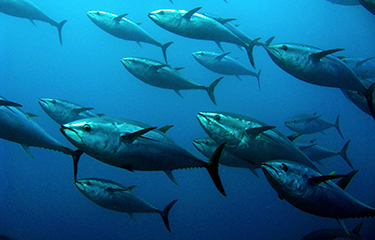The International Commission for the Conservation of Atlantic Tunas (ICCAT) has approved a rollover of 2020’s total allowable catch (TAC) for western Atlantic bluefin tuna.
In response, non-governmental organizations including The Pew Charitable Trusts have warned the move will likely lead to overfishing of the stock.
The ICCAT approved a TAC of 2,350 metric tons (MT) for 2021, a rollover of the quota used last year. Of that, the United States will be allowed to access 1,247.86 MT, Canada 515.59 MT, Japan 407.48 MT, the U.K. in respect of Bermuda 5.31 MT, France in respect of St. Pierre and Miquelon 5.31 MT, and Mexico 128.44 MT.
That quota, according to The Pew Charitable Trusts, will likely cause overfishing of a “depleted stock.”
“Fishery managers, including in the U.S., have acted against scientific advice and agreed to a quota that will all but guarantee overfishing of the already depleted western Atlantic bluefin tuna. This decision calls into question ICCAT’s commitment to science-based, precautionary management,” Grantly Galland, and officer with The Pew Charitable Trusts international fisheries team, said in a release.
According to Pew, ICCAT scientists had said any quota larger than 1,000 MT would lead to a further decline of the stock, and require a greater catch reduction in future years. ICCAT’s adopted proposal said that the results of the 2020 western Atlantic bluefin tuna stock assessment “indicates a concern for maintaining the current TAC level for the next three years.”
Galland said the decision to continue the 2,350 MT quota flies in the face of the scientific advice from ICCAT’s own scientific advisors.
“In 2017, ICCAT abandoned its 20-year rebuilding plan for western bluefin and instead adopted a new approach that allowed them to increase quotas in the short term, but which scientists warned would necessitate a quota decrease just three years later,” Galland said. “Instead of taking those cuts this year, managers have again neglected their responsibility to deliver sustainable and precautionary management and are instead rolling over a quota which scientists say has a 94 percent chance of overfishing. Ignoring scientific advice and postponing necessary cutbacks is a surefire way to drive down a population and harkens back to ICCAT’s failed management of eastern bluefin as recently as a decade ago.”
The new quota includes a provision that the TAC will be reviewed “with a view to addressing overfishing in 2023 at the latest with at least a 50 percent probability,” but according to Pew that will still allow years of overfishing against the recommendations of scientists. The organization added that being forced to meet virtually due to COVID-19 isn’t an excuse for the lack of action.
“[Regional fishery management organizations] have had to make adjustments to a virtual world,” Galland said. “But ICCAT and others cannot use that as an excuse to ignore science or to disregard their mandates to manage fisheries sustainably. The fish stocks managed by RFMOs are worth billions of dollars each year, and the global community is increasingly paying attention to how these vital public resources are managed. This year, RFMOs, including ICCAT, must do better and take on the difficult work of reforming the way they do business.”
Photo courtesy of Guido Montaldo/Shutterstock







